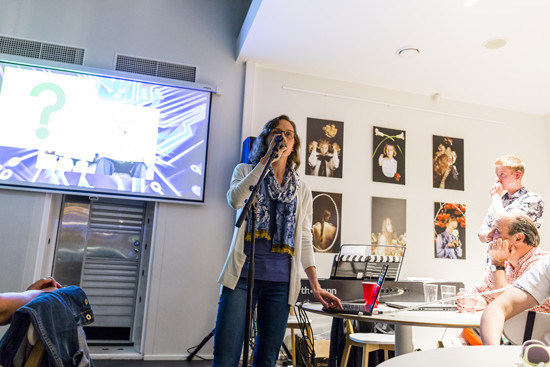We should all understand the importance of cyber security for our everyday life, says researcher Mirva Salminen who looks at digitalisation and cyber security in the Arctic.
When researcher Mirva Salminen moved to Rovaniemi about a year and a half ago, the number of places she had lived in during her life went up to twenty. Salminen was accustomed to moving regularly, but Lapland was a new and unfamiliar living environment that she had not found particularly interesting other than as a hiking and skiing destination. As is typical of researchers, Salminen’s interest in a subject, its characteristics and related phenomena is most often generated through her own research.
- Before, Lapland was not one of my research priorities. Arctic issues have become more important and more familiar after I moved to Rovaniemi and joined the research team of the Arctic Centre. The international atmosphere of the city was also a positive surprise.
There are five research groups working at the Arctic Centre. Salminen is part of a three-year research project in the Northern Institute for Environmental and Minority Law. The project looks at digitalisation and cyber security in the northernmost areas of Europe, especially from the points of view of the individual and the community. The project is a cooperation of four organisations: UiT – the Arctic University of Norway, Swansea University in the UK and the Institute for Security and Development Policy in Sweden in addition to the Arctic Centre. Salminen’s role in the project is connected to cyber security that she has worked on for a long time, both in the public and the private sector.
– The Arctic Centre needed someone who knew about cyber security, and that was how I ended up here. With the project, she will also complete her doctoral dissertation.
The research project that was launched in early 2017 and will continue until the end of 2019 is one of a kind. The digitalisation and the cyber security of the Arctic regions are researched side by side, not as two separate phenomena. The latter convention is the prevailing one, according to Salminen, and it can be problematic. If things are kept separate, the discussion becomes fragmentary.
- Digitality is often seen as something positive, while with cybersecurity the discussion easily takes a negative turn. In our research, we bring the opportunities and challenges together and examine them in a comprehensive way. Everything affects everything, and we should all understand the importance of cyber security for our everyday life.

Last autumn the University of Lapland organized Science Slam during the Science Days. Mirva Salminen performed a rap on cyber security. Photo: Marko Junttila
The three-year endeavour has now reached midterm, and according to Salminen it is well on schedule. She gives credit for that to the professional and international unit at the Arctic Centre, as well as to the researchers in the collaborating organisations that share a common vision and interest in the Arctic regions. Salminen herself has worked in Rovaniemi since summer 2016. The work has included both lonely hours in the office on the third floor of the Arktikum house and plenty of international cooperation.
– For one and half years I have been writing, reading and giving talks which are all par for the course for a researcher, Salminen laughs.
Towards the end of the project, the research results will be made available to everyone in the form of academic articles. In the meantime, the researchers will speak in various national and international events. The next one will take place towards the end of May, when an open conference Human Security and a Cyber Multi-disciplinary Framework in the European High North will start at the Arctic Centre on 24 May.
Mirva Salminen
• Researcher, Northern Institute for Environmental and Minority Law
• Master of Social Sciences (M.Sc.)
• Research topics: cyber security, commercialisation of security, digitalisation in Europe's northern regions
• Motto: ”Curiosity makes the world interesting.”
Additional information:
• Lacris profile
• Arctic Centre profile
• Human Security and a Cyber Multi-disciplinary Framework in the European High North conference 24-25 August 2018
Text and photo: Maria Paldanius